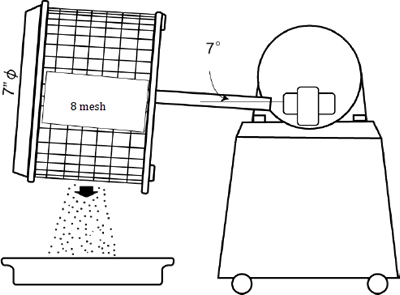Test Method: TJFS-112 Green sand moldability test method
P. Application
This applies to the test method of measuring moldability.
2. Definition
Green sand moldability is a measure of viscosity of the sand as affected by such factors as binder/water ratio, or degree of mulling.
3. Instrument and apparatus
3.1 Moldability tester
As shown in Fig.1, a meshed cylindrical cage of nominal mesh size of 2380μm (8 mesh) with the diameter of 178mmφ and height of 145mm is attached to an axis with an inclination of 7 degree from the horizontal position. The cylinder is rotated at a speed of 57 rotations per minute through the axis, a reduction gear, and a motor.
3.2 Balance
A balance of the precision of 0.1g is used.
3.3 Sieve
A sieve of the nominal mesh size of 5.66mm is used.
3.4 Inspection
The instrument and apparatus used in the test are checked at an appropriate interval to maintain the necessary precision.
4. Testing procedure
4.1 Preparation of specimens
Green sand of 200g is sampled after sieving through a sieve of the nominal mesh size of 5.66 mm.
4.2 Operation
The sampled sand is put in the moldability tester cage and the cage is rotated for 10 seconds. The weight of the sand passed through the mesh is measured.
4.3 Calculation of moldability
Moldability is calculated from the weight of the sand passed and the weight of the original sample (200g) by the following equation.
where
\[MB = {W2 \over W1} \times 100 \]where
\[ \left\{ \begin{array}{l} MB &= moldability \ () \\ W1 &= the \ initial \ sand \ weight \ put \ in \ the \ cage \ (200g) \\ W2 &= weight \ of \ the \ sand \ passed \ through \ the \ cage \ mesh \ (g) \end{array} \right. \]5. Expression
Green sand moldability is expressed in %.
6. Record
The result is calculated to the second decimal place. Test is repeated three times or more from the same batch of sand and averaged using values within 5% deviation.

Fig.1 Moldability tester

